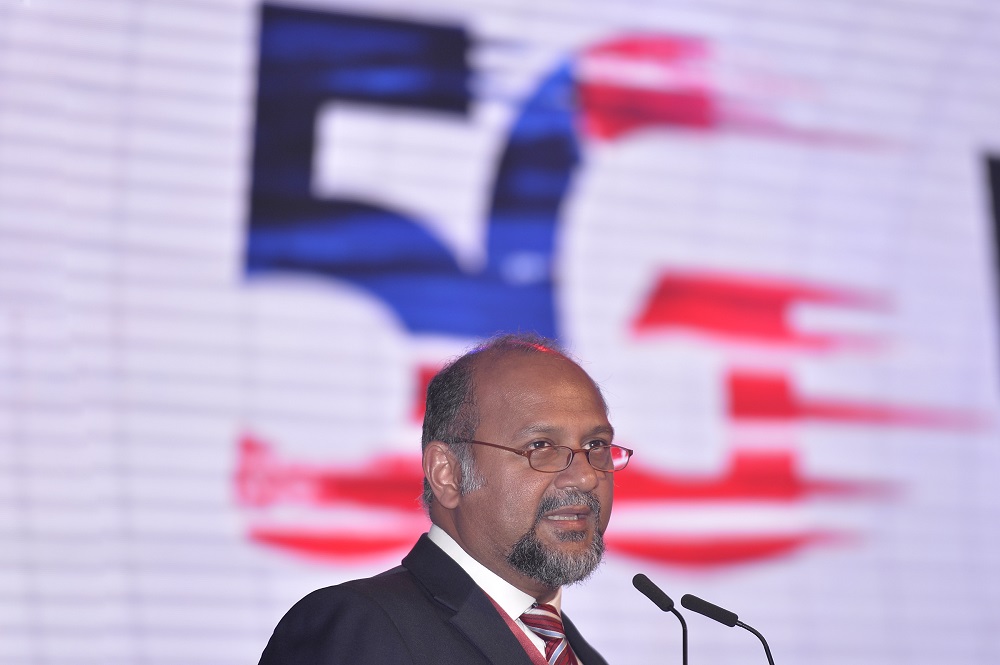PUTRAJAYA, April 18 — Communications and Multimedia Minister Gobind Singh Deo wants the fifth-generation technology or better known as 5G to be another milestone to a greater Malaysia.
“This is because 5G will amplify Malaysia’s capacity to participate in the Fourth Industrial Revolution (IR4.0), and enable its industries to fully exploit the power of artificial intelligence, robotics, big data, virtual reality and software engineering,” he said.
Speaking at the 5G Malaysia showcase launch here today, Gobind said the 5G technology would bring innovation which would substantially impact on almost every sector including education, transportation, agriculture, healthcare, manufacturing, entertainment and public safety.
“The Multimedia Super Corridor (MSC) has placed Malaysia on the world map. Secure in our strengths, proud of our history and confident in our future, let us use this opportunity to continue the journey we started 23 years ago,” he said, adding that the government could not succeed in building the nation alone and required the collective participation of everyone.
The showcase was launched by Prime Minister Tun Dr Mahathir Mohamad.
Eleven exhibitors are participating in the 5G Malaysia Showcase at Kompleks Perbadanan Putrajaya to highlight different applications for industries including education, health care, farming and smart manufacturing.
According to Gobind, today’s launch and showcase was a continuation of that MSC journey which began 23 years ago.
“It is a journey that we embrace together, as a country, confident and hopeful that we will together through technology build a better Malaysia, a country in which everyone will collectively benefit and prosper,” he said.
In the spirit of innovation forged from the early days of the MSC, Gobind proudly said that Malaysia was now amongst the first countries in Asia and the world to roll out the next generation of 5G connectivity infrastructure.
In June last year, Gobind said the government adopted a new approach to broadband and connectivity, where it took steps to improve the quality of broadband, to increase speeds and to reduce wherever possible pricing of fixed broadband.
“The impact of this initiative, which involved 1.2 million people was a reduction in prices of between 35 per cent to 55 per cent and increase of internet speeds in some instances by 10 times from July to December last year,” he said.
Under the new policy, Gobind said an entry-level 30Mbps package costs RM79 as compared to previous 10Mbps package of about RM129, and the new policy translates to a yearly reduction in the cost of living by RM600 while increasing the speed by three times for entry-level packages.
It also put Malaysia ahead in terms of investment choice as connectivity was now much sought after when decisions were made as to whether or not businesses should expand into any particular country, he said.
Gobind said the government also rolled out the National Fibersation and Connectivity Plan (NFCP) in October last year, which provides a clear roadmap and targets to be achieved in 2023.
“Yes, it is an aggressive implementation plan but we must rise to the challenge as time is of the essence. We need infrastructure to remain globally competitive and this government aims to deliver notwithstanding the odds stacked against us,” he said.
Gobind also praised Dr Mahathir’s vision to recognise the need to stay ahead in the world of technology as far back as 1996, where the prime minister saw great potential in its strength and a future in which connectivity, big data and robotics, amongst others would be essential areas upon which the world would operate.
“He therefore pitched Malaysia as a model of a modern digital nation with the best possible environment or ecosystem to harness the full potential of the industrial revolution.
“This vision, which was translated into the Multimedia Super Corridor or the MSC, continues to be a source of pride for us Malaysians. It was more than a technological promise. It was a promise that sparked a sense of hope for a better tomorrow for all of us,” he said. — Bernama



















